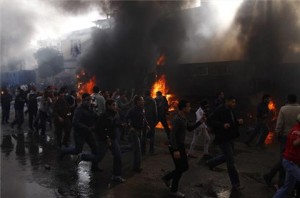History’s Side in Egypt
 The popular uprising in Egypt today will conclusively change the political dynamics in the most populous Arab country, no matter what the short term outcome. Hosni Mubarak might hang on to the presidency for some time, but the parameters have radically changed. (I can’t take my eyes off Al Jazeera.)
The popular uprising in Egypt today will conclusively change the political dynamics in the most populous Arab country, no matter what the short term outcome. Hosni Mubarak might hang on to the presidency for some time, but the parameters have radically changed. (I can’t take my eyes off Al Jazeera.)
In August and September, all the Egyptians I interviewed about their country after Mubarak ruled out mass protests as even a remote possibility – especially mass protests not organized by the Muslim Brotherhood.
But that’s exactly what we’ve seen now; tens of thousands of people, maybe more, in virtually every major Egyptian city, willing to march and knock heads and risk death to call for an end to Mubarak’s rule. They’re not doing it under the banner of the Muslim Brothers or of the small, organized secular opposition.
So one shibboleth of Egyptian politics has been cast aside: the Egyptian people are capable of revolt.
What follows will depend on many factors: the endurance and persistence of the protestors; the choices of influential politicians, in and out of the regime; and most of all, I think, the choices the military makes.
Right now, police and intelligence run Mubarak’s police state. The military governs its own fiefdom, and considers itself the steward of the nation’s sovereignty. As retired General Hosam Sowilam told me this summer, in a time of transition the military “shall obey the president because he will be accepted by the people. But we will not accept any interference by the political parties into our military affairs.”
If the people withdraw their support from Mubarak, I guess the military will see its advantage in standing with them and not with the regime. In terms of bald self-interest, the military will want to maximize its influence with whomever follows Mubarak. That’s similar to the choice Tunisia’s military made.
A handful of power centers can play a role in crafting an alternative to Mubarak’s rule: Egypt’s intelligence chief; the military; the interior ministry; and to a lesser extent the institutions of civil society, both pro- and anti-regime: the NDP, the Muslim Brotherhood, the secular opposition parties, the protest movement, ElBaradei’s organization. Only the military has the weight to tilt the balance on its own.


Nice post. One thing to keep in mind, along the lines of your comment that the military might choose to stand with the people, is that Mubarak is, in a sense, a lame duck. How many people within his own government were expecting him to still be in control in five years? Given that, it is hard to see why generals and intel chiefs would want to take a tough, unpopular stand for someone who is not going to be able to pay back favors for very long. I would think a lot of them are looking for a figurehead (or actual leader) who agrees to preserve their clout and the overall regime but replace Mubarak to placate the people.